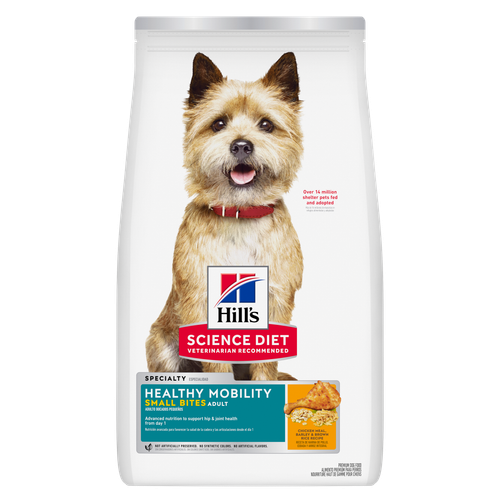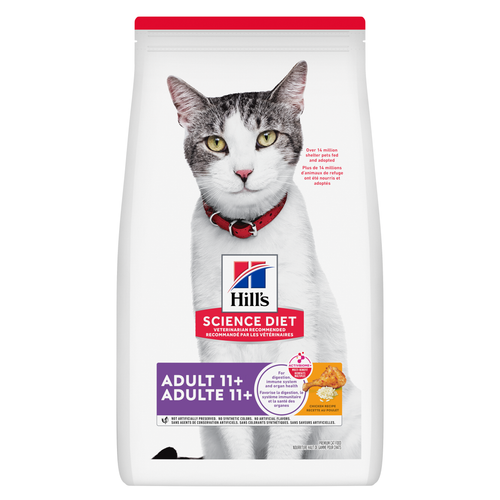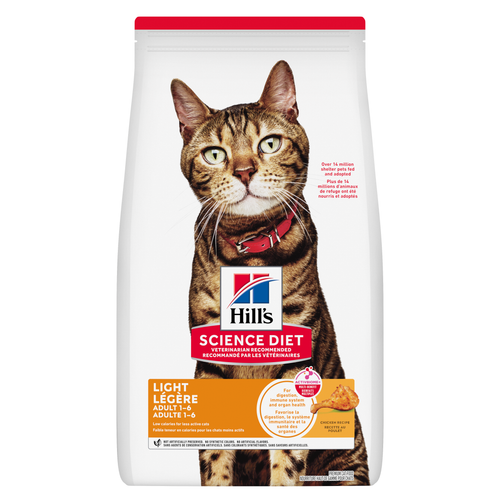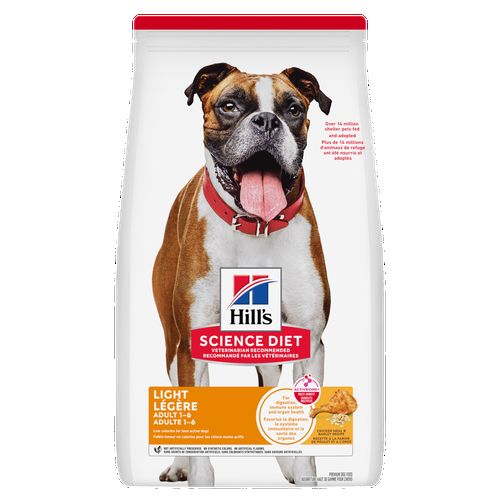
-
Find the right food for your petTake this quiz to see which food may be the best for your furry friend.Find the right food for your petTake this quiz to see which food may be the best for your furry friend.Featured products
 Adult Healthy Mobility Small Bites Chicken Meal, Barley & Brown Rice Recipe Dog Food
Adult Healthy Mobility Small Bites Chicken Meal, Barley & Brown Rice Recipe Dog FoodAdvanced nutrition to support hip & joint health from day 1
Shop Now Adult Light Large Breed Chicken Meal & Barley Recipe Dog Food
Adult Light Large Breed Chicken Meal & Barley Recipe Dog Food18% lower calories vs. Science Diet Large Breed Adult
Shop Now Adult Sensitive Stomach & Skin Small & Mini Chicken Recipe Dog Food
Adult Sensitive Stomach & Skin Small & Mini Chicken Recipe Dog FoodHill's Science Diet Sensitive Stomach & Skin Small & Mini dry dog food is tailored nutrition for Small & Mini dogs while being gentle on stomachs. Nourishes skin & promotes a lustrous coat.
Shop NowFeatured products Adult 11+ Chicken Recipe Cat Food
Adult 11+ Chicken Recipe Cat FoodSupports brain health & beautiful fur. Helps keep immune system, heart & kidneys healthy.
Shop Now Adult Healthy Cuisine Seared Tuna & Carrot Medley Cat Food
Adult Healthy Cuisine Seared Tuna & Carrot Medley Cat FoodDelicious seared tuna paired with tender carrots in a mouthwatering sauce
Shop Now Adult Light Chicken Recipe Cat Food
Adult Light Chicken Recipe Cat Food20% lower calories vs. Hill's Science Diet Adult
Shop Now -
Dog
- Dog Tips & Articles
-
Health Category
- Weight
- Food & Environmental Sensitivities
- Urinary
- Digestive
- Joint
- Kidney
- Dental
- Cancer
-
Life Stage
- Puppy Nutrition
- Adult Nutrition
- Senior Nutrition
Cat- Cat Tips & Articles
-
Health Category
- Weight
- Skin & Food Sensitivities
- Urinary
- Digestive
- Kidney
- Dental
- Stress
- Cancer
-
Life Stage
- Kitten Nutrition
- Adult Nutrition
Featured articles Importance of DHA in your Pet's Food
Importance of DHA in your Pet's FoodLearn about DHA, Docosahexaenoic Acid, a natural omega-3 fatty acid that is essential in the development of the brain and nervous system in cats & dogs.
Read More Water
WaterDiscover why water is the most important nutrient for your dog or cat to live a healthy life. Find out how much water your pet should consume each day.
Read More Antioxidants
AntioxidantsUnderstand the importance of antioxidants in your dog or cat's food, and how they can help protect your pet and keep them healthy.
Read More -


The ear is divided into four parts:
- Pinna - the part outside the head
- External ear canal
- Middle ear - found on the inside of the eardrum
- Inner ear - consists of tubes and nerve structures that transmit sound to the brain. The inner ear also helps control your dog’s balance.
Ear inflammations are common in dogs and have many causes. Dogs, like bloodhounds, with droopy ears and/or a great deal of hair, like the English sheepdog, in the ear canal seem to have the most problems with ear inflammations. These characteristics plus the warm and enclosed nature of the ear canal provide an excellent environment for infectious agents that cause inflammation.
Causes
Bacteria, fungi and ear mites are common causes of ear inflammation in dogs. Allergies, seborrhea, an underactive thyroid gland, trauma, foreign objects (such as plant seeds) and tumors also cause ear inflammation.
Most cases of middle ear and inner ear inflammation are caused by bacteria that pass through a ruptured eardrum. One cause of a ruptured eardrum is overzealous cleaning of the ear canal. Throat infections may also cause middle ear inflammations.


Tasty Tips
Diagnosis by your Veterinarian
Examination of your dog’s ear canal and eardrum by your veterinarian with an instrument called an otoscope helps determine the cause. If the ear is very painful, your dog may need to be sedated for a thorough exam. Other tests include: microscopic examination of earwax; ear cultures; thyroid hormone studies; X-rays; surgical biopsy.
Most ear inflammations can be treated successfully once appropriate diagnostic tests are completed by your veterinarian.
Treatment and Home Care
Ear issues must be treated persistently and specifically, depending on the diagnosis. In some cases, treatment may need to be continued for six weeks or longer.
In most cases your veterinarian will need to clean your dog's ear and remove the hair from the ear canal before treatment will be effective. The use of medications to dry your dog’s ears can be helpful. More aggressive treatment, such as surgery, may be recommended for severe cases.
Home care usually includes administering medications directly into your dog’s ear canal according to your veterinarian’s instructions. Failure to properly administer ear preparations could lead to chronic inflammation, so be sure to follow your veterinarian’s recommendations.
Nutrition
If your dog has an ear issue, your veterinarian may suggest a change in your dog’s food. In some cases, your veterinarian may recommend a therapeutic hypoallergenic dog food to help limit exposure to potential allergens. Such dog foods may include Hill’s® Prescription Diet® brand dog foods.
Unless recommended otherwise by your veterinarian, gradually introduce any new dog food over a seven-day period. Learn how to transition your dog gradually to a new dog food.


One of our staff authors prepared this article for you
Related products

Hill's Science Diet Sensitive Stomach & Skin Small & Mini dry dog food is tailored nutrition for Small & Mini dogs while being gentle on stomachs. Nourishes skin & promotes a lustrous coat.

18% lower calories vs. Science Diet Large Breed Adult

18% lower calories vs. Science Diet Adult

Advanced nutrition to support hip & joint health from day 1
Related articles

Discover how the field of dog science is giving us more and more insights into the inner workings of our furry best friends.

Learn how dogs with sensitive skin can have special dietary needs, how they can develop over time in a healthy dog, and how Hill's dog food can help.

Learn basic steps & precautions for treating a cut on your dog, including what you can put on the cut, and when you should take them to the vet.

Your dog's coat and skin are a big part of your dog's overall health. Ensure you keep your dog's coat healthy, by following these simple tips.

Put your dog on a diet without them knowing
Our low calorie formula helps you control your dog's weight. It's packed with high-quality protein for building lean muscles, and made with purposeful ingredients for a flavorful, nutritious meal. Clinically proven antioxidants, Vitamin C+E, help promote a healthy immune system.
Put your dog on a diet without them knowing
Our low calorie formula helps you control your dog's weight. It's packed with high-quality protein for building lean muscles, and made with purposeful ingredients for a flavorful, nutritious meal. Clinically proven antioxidants, Vitamin C+E, help promote a healthy immune system.

